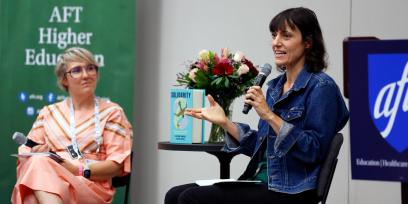The fight to reclaim higher education isn’t just about those in higher education; it’s ultimately a fight for democracy. That’s why we must engage students, families and our larger communities, including workers in other sectors and social and civil rights groups, to build meaningful solidarity. In the recently released book, Solidarity: The Past, Present, and Future of a World-Changing Idea, documentarian and organizer Astra Taylor shows how solidarity helps us counter extremist attacks on higher education and win a better life for all of us.
Attendees of Tuesday’s Higher Education breakfast learned more about how the concept of solidarity informs both this book and Taylor’s work to fight student debt and advocate for free public college for all. Taylor is the co-founder the Debt Collective, which she described as an “experimental union of debtors” coming together to demand debt cancellation. In the book, Taylor (with co-author Leah Hunt-Hendrix) connects the concept of solidarity, which is fundamentally about our mutual interdependence, to indebtedness. She argues that the demand for debt relief goes hand in hand with demands for affordable healthcare, housing, free higher education, a green new deal and other conditions necessary for a healthy democracy in which we care for each other.
How do we get others to buy into this vision and see the fight against debt as their own? For Taylor, solidarity is what holds us together and makes it possible to transform our conditions. We must come together across our differences both within higher education and between sectors (for instance, between higher education and healthcare, as many universities also operate large medical centers where medical debt can devastate both patients and low-income workers alike). Taylor emphasized that debt is systemic and ultimately a matter of racial and economic injustice—and it will need all of us to solve.
[Lesley Gonzalez/photos by Suzannah Hoover]


